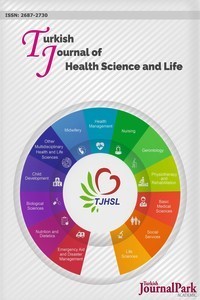PRACTICES AND PERCEPTION TOWARD MEDICATION USAGE FOR THE CORONAVIRUS DISEASE-2019 AMONG PEDIATRIC NURSES: A CROSS-SECTIONAL SURVEY
PRACTICES AND PERCEPTION TOWARD MEDICATION USAGE FOR THE CORONAVIRUS DISEASE-2019 AMONG PEDIATRIC NURSES: A CROSS-SECTIONAL SURVEY
Self-medication, , Nurses, , Pediatrics, , COVID-19, Turkey,
___
- 1. Peck JL. COVID-19: Impacts and Implications for Pediatric Practice. J Pediatr Health Care. 2020;34(6):619-629. https://doi.org/10.1016/j.pedhc.2020.07.004.
- 2. Bedford J, Enria D, Giesecke J, Heymann DL, Ihekweazu C, Kobinger G. (2020). COVID-19: Towards controlling of a pandemic. Lancet. 2020;395(10229), 1015–1018. https://doi.org/10.1016/S0140-6736(20)30673-5.
- 3. Pfizer and Biontech. Pfizer and Biontech conclude phase 3 study of covid-19 vaccine candidate, meeting all primary efficacy endpoints. 2020. https://www.pfizer.com/news/press-release/press-release-detail/pfizer-and-biontech-conclude-phase-3-study-covid-19-vaccine.
- 4. Moderna. Moderna’s COVID-19 Vaccine Candidate Meets its Primary Efficacy Endpoint in the First Interim Analysis of the Phase 3 COVE Study. 2020. https://investors.modernatx.com/news-releases/news-release-details/modernas-covid-19-vaccine-candidate-meets-its-primary-efficacy.
- 5. Domiati S, Itani M and Itani G. Knowledge, Attitude, and Practice of the Lebanese Community Toward COVID-19. Front. Med. 2020;7:542. https://doi.org/10.3389/fmed.2020.00542.
- 6. Ghosh R, Dubey MJ, Chatterjee S, Dubey S. Impact of COVID-19 on children: special focus on the psychosocial aspect. Minerva Pediatr. 2020;72:226-35. https://doi.org/10.23736/S0026-4946.20.05887-9.
- 7. World Health Organization (WHO). 2020. State of the World's Nursing: Executive Summary, Geneva: World Health Organisation. https://apps.who.int/iris/bitstream/handle/10665/331673/9789240003293eng.pdf?sequence=1&isAllowed=y.
- 8. Onchonga D; Omwoyo J, Nyamamba D. Assessing the prevalence of self-medication among healthcare workers before and during the 2019 SARS-CoV-2 (COVID-19) pandemic in Kenya. Saudi Pharm J. 2020;28(10): 1149-1154. https://doi.org/10.1016/j.jsps.2020.08.003.
- 9. Barros ARR, Griep RH, Rotenberg L. Self-medication among nursing workers from public hospitals. Rev. Latino-Am. Enfermagem [Internet]. 2009;17(6):1015-1022. https://doi.org/10.1590/S0104-11692009000600014.
- 10. Zelalem T. Tesfaye, Asrat E. Ergena, Bilal T. Yimer. Self-Medication among Medical and Nonmedical Students at the University of Gondar, Northwest Ethiopia: A Cross-Sectional Study. Scientifica. 2020; 2020:1-5. https://doi.org/10.1155/2020/4021586.
- 11. Bamgboye EA, Amoran OE, Yusuf OB. Self medication practices among workers in a tertiary hospital in Nigeria. Afr J Med Med Sci. 2006 ;35(4):411-415.
- 12. Hwang JH, Cho HJ, Im HB, Jung YS, Choi SJ, Han D. Complementary and alternative medicine use among outpatients during the 2015 MERS outbreak in South Korea: a cross-sectional study. BMC Complement Med Ther. 2020;20(1):147. https://doi.org/10.1186/s12906-020-02945-0.
- 13. Dehghani-Samani A, Kamali M , Hoseinzadeh-Chahkandak F. The Role of Vitamins on the Prevention and/or Treatment of COVID-19 Infection; a Systematic Review, Mod Care J. [Online ahead of Print]. 2020;17(3):e104740. https://doi.org/10.5812/modernc.104740.
- 14. Ehigiator O, Azodo CC, Ehizele AO, Ezeja EB, Ehigiator L, Madukwe IU. Self-medication practices among dental, midwifery and nursing students. Eur J Gen Dent. 2013:2:54-7. https://www.ejgd.org/text.asp?2013/2/1/54/106813.
- 15. Paumgartten FJR, Oliveira ACAMXD. Off label, compassionate and irrational use of medicines in Covid-19 pandemic, health consequences and ethical issues. Ciênc. saúde coletiva [Internet]. 2020;25(9):3413-3419. https://doi.org/10.1590/1413-81232020259.16792020.
- 16. Arshad MS, Khan U, Sadiq A, et al. Coronavirus disease (COVID-19) and immunity booster green foods: A mini review. Food Sci Nutr. 2020;8:3971–3976. https://doi.org/10.1002/fsn3.1719.
- ISSN: 2687-2730
- Başlangıç: 2018
- Yayıncı: Mümin POLAT
EARLY CHILDHOOD CARIES RISK FACTORS
COLIC SCALE SCORES AND ASSOCIATED FACTORS IN INFANTS DIAGNOSED WITH INFANTILE COLIC
Yusuf KARATAŞ, Zakir KHAN, Gönül PEKKAN, Çağrı BİLEN, Ezgi Sena GÖREN ÖZAGİL, Ayşe Büşra ABUSSUUTOĞLU
EVALUATION OF DIGITAL LITERACY STATUS OF UNIVERSITY STUDENTS
Nurvet BÜYÜKYÖRÜK, Kerime ÖĞÜT DÜZEN
AN OVERVIEW OF DISASTER RESILIENCE
